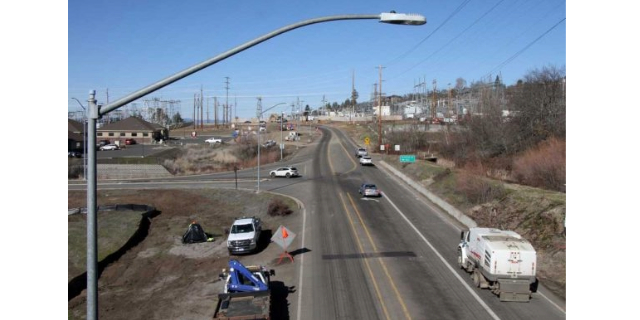Trump and undocumented immigrants: What a crackdown could mean for Oregon
Published 7:00 am Sunday, November 17, 2024

- A farmworker picks apples in Oregon.
A threatened immigration crackdown under the returning Trump administration could force family separations and have detrimental effects on Oregon’s workforce, particularly in the agricultural and construction industries, community leaders fear.
Trending
Officials with organizations that work with the state’s immigrant communities said they aren’t trying to stir more fear but want communities to be aware of what could happen and how to prepare. They said they will continue to help protect the state’s immigrant communities, fight against deportations and educate people about their rights.
“It could be really disruptive,” said John Herrera, director of immigration legal services at Catholic Charities of Oregon.
Trump, who will replace President Biden in January, has pledged “the largest deportation operation” in American history. Trump’s previous administration deported more than 200,000 people annually, although Oregon did not see large-scale raids during those years.
Trending
By one count, Oregon is home to an estimated 120,000 undocumented immigrants, or 2.9% of the state’s population, according to data from the Pew Research Center, a nonpartisan think tank. The state’s undocumented workforce is estimated at 90,000, accounting for 4.4% of the labor market. Both metrics put Oregon in the top 21 of states nationally.
But advocates say Oregon could be at higher risk of deportations for two reasons: Oregon has a higher share of undocumented immigrants from countries that have historically been more receptive to taking citizens back; and the state’s sanctuary law prohibiting police from cooperating with federal officials on immigration enforcement could draw extra attention from a Trump administration looking to make an example.
The Trump administration may also attempt to withhold federal funding from Oregon, leaders worried, because of its status as a sanctuary state. According to the Immigrant Legal Resource Center, “only Oregon and Illinois have comprehensive state laws restricting transfers” of people to U.S. Immigration and Customs Enforcement, noting that other states with sanctuary laws still transfer “many immigrants” to immigration detention.
“There is concern that under a Trump administration, sanctuary states like Oregon could be a focal point of enforcement due to retaliation about our refusal to conform to federal directives,” said Evelyn Kocher, communications manager with the Latino Network. “We are extremely concerned about these possibilities and are preparing accordingly to ensure the safety of our communities.”
While there were no documented large workplace raids in Oregon under the previous Trump administration, they have happened in the past, and several smaller incidents that made the news more recently left immigrant communities rattled.
In 2007, federal officials raided a food-processing plant in Portland under the Bush administration. A federal law makes it illegal for employers to knowingly hire undocumented workers, and more than 165 workers were detained in the Portland raid.
Under Trump in 2017, 11 Latinos were arrested in Woodburn when ICE stopped two vans – a half-hour apart from one another – as 22 people commuted to work. In 2018, a coordinated operation to raid nearly 100 7-Eleven stores across the country led to 21 arrests in several states, including an unspecified number in Oregon. In 2019, ICE arrested six workers in Hermiston.
Those numbers don’t provide a full picture of immigration enforcement in the state, however, because most ICE arrests don’t receive media attention. For example, Oregon saw 1,171 ICE arrests in 2017, the last year with full data, according to the Transactional Records Access Clearinghouse at Syracuse University.
Even a small number of ICE arrests, such as those in Woodburn in 2017, can have profound repercussions in immigrant communities, said Patti Verduzco, communications director at PCUN, Oregon’s largest farmworkers union.
“These events created a chilling effect, instilling fear within the immigrant community across Oregon,” she said in a text. “The immediate aftermath saw children not attending school the following day, and some families faced the heart-wrenching decision to leave behind the lives” they built in Oregon.
Oregon may also be a target for enforcement because of its composition of undocumented immigrants. More than half of the state’s undocumented immigrants are from Mexico, according to data from the Pew Research Center.
“States that have significant Mexican and northern Central American populations that are unauthorized, as is the case for Oregon, would be more likely to see more significant removal activity,” said Michelle Mittelstadt, director of communications at the Migration Policy Institute.
Historically, Mittelstadt said, it has been easier for the U.S. government to deport people from Mexico, El Salvador, Guatemala and Honduras compared to other countries that limit cooperation in taking back citizens. The previous Trump administration worked to make it easier to deport people to other countries, as well, taking aggressive steps to pressure nations that had stopped taking back deportees by issuing Visa sanctions against Cambodia, Laos and Myanmar, among others.
Advocates and business groups say any deportation initiative could have ripple effects on key industries. One-fourth of Oregon’s undocumented workers are estimated to work in agriculture or construction, raising the potential for targeted raids of worksites. Sales from the agriculture industry in Oregon reached $6.7 billion in 2022, a sum that ranked 28th nationally.
“The agricultural industry relies heavily on migrant and immigrant labor, the majority of which is undocumented,” said Verduzco, with PCUN. “History tells us what happens when we get rid of the people picking our food and tending to America’s most prized crops. Crops go unpicked and are at risk of rotting.”
Impacts of deportations, Verduzco said, would extend far beyond immigrant communities because undocumented immigrants are the “backbone of essential industries.”
“Any kind of mass deportation effort,” she said in an email, “would be a disaster for the Oregon community at large.”
Kocher, with the Latino Network, agreed.
“Mass deportations would decimate many smaller and rural communities,” she said in an email, “especially as well as threatening much of Oregon’s agricultural, timber, and construction industries as a whole.”
Austin McClister, spokesperson for the Oregon Farm Bureau, said the state’s agriculture industry and its economy rely on foreign workers, including undocumented workers, to put food on the table for all Oregonians. Immigration solutions are for Congress to address, he said, and not just by a presidential administration.
“It’s widely accepted that the immigration system must be fixed,” he said in a statement, “but solutions should ensure vital industries like farming, processing, distribution and food services are not harmed by unintended consequences.”
While there’s uncertainty about what might unfold, organizations are preparing.
Frank So, executive director for Ecumenical Ministries of Oregon, said his organization will double-down on its commitment to help protect the community from “unjust deportations.”
“There’s a sense of fear,” he said, “and then there’s a sense of a call to do more.”
So said he hopes lawmakers will consider allocating funds as soon as next month to help Oregonians seek legal permanency or citizenship. Last session, his organization unsuccessfully introduced House Bill 4085, which would have helped legal permanent residents apply to become naturalized citizens. The services would also have helped eligible undocumented Oregonians pursue a pathway to legal status, such as through a U visa or by applying for asylum.
“Now, because of this transition,” So said, “I think this should be (a) sufficient urgent matter for them to take up.”
A group of organizations, including So’s, plan to seek between $2 million and $14 million to provide know-your-rights education, with legal pathway and safety planning for immigrant communities across the state, as well as rapid response immigration legal services, said Britt Conroy, director of public policy and environmental advocacy at Ecumenical Ministries of Oregon. If approved, he said, funding would be distributed by the Oregon Department of Human Services and would help provide those services from December through June, until lawmakers vote on the next budget.
“The Legislature is responsible for addressing needs of today,” he said, “and preparing for threats to the community in the future.”
Some of those services overlap with an existing state-funded program referred to as the universal representation program or Equity Corps of Oregon.
Advocates, Conroy said, also want to help prevent immigrants from falling prey to notarios or notaries, some of whom are known for defrauding immigrants. That profession in Latin America has an education that’s closer to an attorney, unlike in the United States, where the role typically verifies document signings. Many in the immigrant community don’t understand the difference, and there have been cases in other states of notaries acting beyond their scope, making false promises to immigrants who come to them for help.
There are people, Conroy said, “taking advantage of what is a very desperate situation.”
Educating immigrant communities about their Constitutional rights will also be critical so they know how to exercise them, said Dagoberto Morales, director at NOWIA Unete Center for Farm Worker Advocacy.
The right against unreasonable search and seizures, the right to an attorney and the right to due process apply to everyone regardless of immigration status.
Herrera said immigrant families should plan to gather their children’s personal documents in the event they are detained and their children need to stay with someone else. People who believe they are eligible for immigration relief should contact an attorney.
“Deportations is a concern for everyone because that means separation of families,” Morales said in Spanish. “We need to educate the community.”
Oregon’s environmental, immigrant, democracy groups prepare for another Trump presidency









